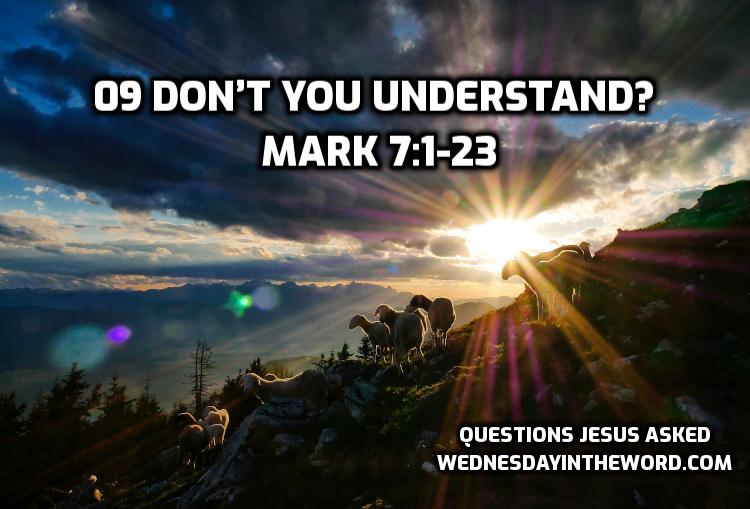Jesus asks this question of his disciples. He highlights a specific area of concern: what makes a person unclean?
Passage
7:1Now when the Pharisees gathered to him, with some of the scribes who had come from Jerusalem, 2they saw that some of his disciples ate with hands that were defiled, that is, unwashed. 3(For the Pharisees and all the Jews do not eat unless they wash their hands properly, holding to the tradition of the elders, 4and when they come from the marketplace, they do not eat unless they wash. And there are many other traditions that they observe, such as the washing of cups and pots and copper vessels and dining couches.) 5And the Pharisees and the scribes asked him, “Why do your disciples not walk according to the tradition of the elders, but eat with defiled hands?” – Mark 7:1-5
- The issue in this discussion is ritual purity, no hygiene.
- The practice of ritual hand-washing came from rabbinic tradition, not the law of Moses.
- God’s commands are not being transgressed, only the traditions of the rabbis.
- This is expected religious behavior at the time of Christ.
- Mark tells us twice that the Pharisees “do not eat unless” (vs. 3,4). They take pride not in what they do, but in what they don’t do.
- Mark also tells us the source of their concern is not Scripture, but the traditions of the elders (vs. 5).
- Mark tells us how seriously the Pharisees take this purity by showing us how widely they apply it (vs. 4).
7:6And he said to them, “Well did Isaiah prophesy of you hypocrites, as it is written, “‘This people honors me with their lips, but their heart is far from me; 7in vain do they worship me, teaching as doctrines the commandments of men.’ 8You leave the commandment of God and hold to the tradition of men.” 9And he said to them, “You have a fine way of rejecting the commandment of God in order to establish your tradition! 10For Moses said, ‘Honor your father and your mother’; and, ‘Whoever reviles father or mother must surely die.’ 11But you say, ‘If a man tells his father or his mother, “Whatever you would have gained from me is Corban”’ (that is, given to God)— 12then you no longer permit him to do anything for his father or mother, 13thus making void the word of God by your tradition that you have handed down. And many such things you do.” 14And he called the people to him again and said to them, “Hear me, all of you, and understand: 15There is nothing outside a person that by going into him can defile him, but the things that come out of a person are what defile him.” – Mark 7:6-15
- Jesus quotes Isaiah 29:13.
- Isaiah 28-31 is a series of pronouncements against the nations leaders, predicting they exile because of their blatant disobedience. Jesus picks up on what makes a person clean. The law is not a series of external rules which you put on the outside such that they make you moral inside.
- Jesus does not try to defend the actions of his disciples.
- The Pharisees accuse the followers of Jesus of neglecting the traditions of the elders. Jesus accuses the Pharisees of ignoring the commands of God.
- To grant honor to someone was to give them social weight in the community.
- The Pharisees declared their money and their possession Corban (dedicated to God), so that they could not use them to benefit their elderly or needy parents.
- The core issue is what makes a person acceptable before God.
7:17And when he had entered the house and left the people, his disciples asked him about the parable. 18And he said to them, “Then are you also without understanding? Do you not see that whatever goes into a person from outside cannot defile him, 19since it enters not his heart but his stomach, and is expelled?” (Thus he declared all foods clean.) 20And he said, “What comes out of a person is what defiles him. 21For from within, out of the heart of man, come evil thoughts, sexual immorality, theft, murder, adultery, 22coveting, wickedness, deceit, sensuality, envy, slander, pride, foolishness. 23All these evil things come from within, and they defile a person.” – Mark 7:17-23
- Being good at religious performance is a dangerous thing.
- Purity is not defined by what you do or don’t do on the outside, such as what you eat or how you wash your hands. Purity is determined by who you are on the inside.
- Jesus is not merely undoing the man-made traditions that built up around scripture. He is undoing a tradition which came from scripture by declaring all foods clean.
- Jesus does NOT say, ‘you’re okay the way you are.” He says, you’re much worse off than you thought.
- Jesus tells us the truth about what makes us unclean, and he invites us to come to him to fix it.
For more detail and explanation, please listen to the podcast.
Next: 10 Do you see anything? Mark 8:11-26
Previous: 08 How many loaves do you have? Mark 6:30-46
Series: Questions Jesus Asked
Resources: Gospel of Mark
For help learning to study, see Bible Study 101.
Photo by Jaka Škrlep on Unsplash

